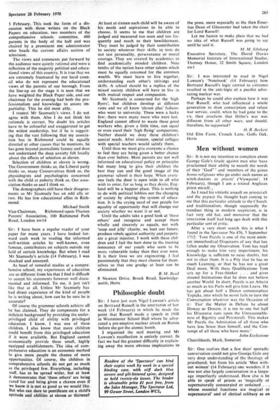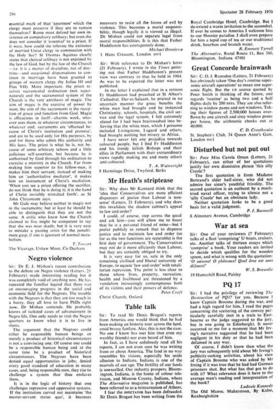Men without women
Sir: It is not my intention to complain about George Gale's tirade against men who 'have proclaimed their ability to mouth the words of their "God"' and 'members of the genus hotno religiosus who go under such names as witch-doctors or priests' ('Viewpoint', 14 February), though I am a retired Anglican priest myself.*
As I read his vitriolic assault on priestcraft and the papacy the thought kept coming to me that this particular attitude to the Church and traditionalism, though supposedly the trendiest thing in modern scepticism, is in
fact very old hat, and moreover that the SPECTATOR itself had long ago dealt with this particular sort of critic.
After a very short search this is what I found in the Spectator No 476, 5 September
1712: Tom Puzzle is one of the most emin- ent immethodical Disputants of any that has fallen under my Observation. Tom has read enough to make him very impertinent; his Knowledge is sufficient to raise doubts, but not to clear them. It is a Pity that he has so much Learning, or 'that he has not a great Deal more. With these Qualifications Tom sets up for a Free-thinker . . . and gives shrewd Intimations that he does not believe another World. In short, Puzzle is an Atheist as much as his Parts will give him Leave. He has got about half a Dozen commonplace Topicks, into which he never fails to turn the Conversation whatever was the Occasion of it: Tho' the Matter in Debate be about Doway (kr Denain, it is ten to one but half his Discourse runs upon the Unreasonable- ness of Bigottry and Priestcraft. This makes Mr Puzzle the Admiration of all those who have less Sense than himself, and the Con- tempt of all those who have more.'
John Ecclestone Churchlands, Mark, Somerset
Sir: One realises that a few days' sporadic conversation could not give George Gale any very deep understanding of the theology of priesthood; but from his article 'Men with- out Women' (14 February) one wonders if it was not also largely conversation in a langu- age imperfectly understood. How else is he able to speak of priests as 'magically or supernaturally consecrated or ordained . . . whose essential functions are magical or supernatural' and of clerical celibacy as an
essential mark of that 'apartness' which the clergy must preserve if they are to remain themselves? Rome must defend her own in- sistence on compulsory celibacy; but even she does not consider it 'essential' to a priest. If it were, how could she tolerate the existence of married Uniat clergy in communion with the Holy See? St Thomas Aquinas clearly states that clerical celibacy is not enjoined by the law of God, but by the law of the Church —i.e. it is a matter of discipline, not of doc- trine—and occasional dispensations to con- tinue in marriage have been granted to groups of western clergy (by Julius HI and Pius VII). More important, the priest re- ceives sacramental ordination (not super- natural) and the sacramental system of the Church is the very antithesis of magic. The aim of magic is the exercise of power by man; the aim of the sacraments is the recep- tion of grace and function from God. Magic is efficacious in itself—charms work, who- ever uses them, in whatever circumstances, to whatever end; sacraments are 'effectual be- cause of Christ's institution and promise', and are to be used only for His purposes, by and for those who admit His authority and His laws. The priest is what he is, not be- cause of some arbitrary taboos and a little judicious self-assertion, but because he is authorised by God through his ordination to exercise a ministry in the Church. Far from making him superior to his fellow-men, it makes him their servant; instead of making him an 'authoritative mediator', it makes him an instrument of Christ's mediation. 'When you see a priest offering the sacrifice, do not think that he is doing it; it is the hand of Christ invisibly stretched forth', as St John Chryostom says.
Mr Gale may believe neither in magic nor in the sacraments; but at least he should be able to distinguish that they are not the same. A critic who knew how the Church claimed to live might be competent to say that she was near death; but it is very easy to mistake a passing crisis for the penulti- mate gasp, if one is ignorant of normal meta- bolism.
T. Towers The Vicarage, Ushaw Moor, Co Durham



































 Previous page
Previous page